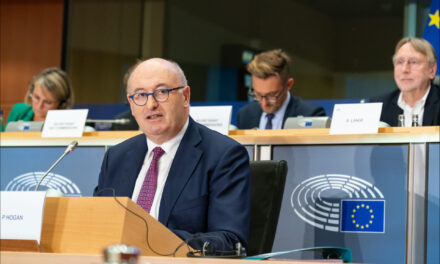A trade deal between the US and the Philippines was announced recently after President Marcos, Jr.’s meeting with US President Trump. While the details have yet to be disclosed, and there are reports characterizing the outcome as more “a loose framework of a deal”, what has been reported so far are as follows:
- The US will levy a 19% tariff on all Philippine exports. This is a one percent decrease from the earlier 20% rate outlined in Trump’s letter to Marcos last July 9, but 2% higher than the 17% rate imposed on the PH on Liberation Day (April 2).
- On the part of the Philippines, it has conceded to lowering to as low as zero tariffs on among other things automobiles and auto part imports from the US;
- Marcos had also announced to the press “that the Philippines has agreed to buy more products from the United States, and an increased importation from the United States for soy products, wheat products, and medicine.”
- Aside from trade, wider concessions were also made. Trump wrote on social media on Tuesday that the new tariff was part of a wider pact, in which the Philippines would remove duties on US goods and that the two countries would cooperate militarily.
The devil is in the details. What did we give to Trump in exchange for a mere 1% reduction from the 20% tariffs? That is the main concern.
Structural Vulnerabilities
On the Auto Industry
The local auto industry—especially assemblers like Toyota and Mitsubishi—already struggles to compete with cheaper imports. The entry of US-made vehicles at zero tariff will only make things worse. US brands benefit from scale, subsidies, and incentives that local manufacturers simply cannot match.
Even local auto parts suppliers, many of which are small and medium enterprises, will feel the blow as demand from assemblers drops. This threatens the entire automotive value chain—jobs, livelihoods, and domestic production capacity.
It could trigger plant closures, layoffs, and a sharp decline in value-added manufacturing—directly undermining government initiatives like the Comprehensive Automotive Resurgence Strategy (CARS).
Flawed framework
For many years the trade strategy of the Philippines has been to push for free trade agreements as a way to gain market access for Philippine exports and attract investments into the country. That strategy is premised on the belief that these FTAs matter and that they are equal partnership agreements, an assumption that we have challenged all along. Now clearly with the unilateral actions by Trump we can say that they don’t matter now and they’re useless. So the effect is clear, the stronger partner sets the rules and the weaker partner follows. It would have deep implications on our strategic development objectives – rebuilding our manufacturing sector, pursuing industrial policy, and strengthening agriculture.
This will further deepen our dependence on imports as it makes it more convenient for us to just import, say cars or auto parts instead of trying to boost local manufacturing. And this would also have repercussions on jobs and wages.
Our exports are already having a hard time competing with Vietnam. The only area where Ph is more competitive is in lower labor costs, aside from that, costs in materials and other inputs are cheaper in Vietnam. Vietnam is also more integrated into regional supply chains compared to the Philippines. Add to that of course our other vulnerabilities- to disaster and natural calamities for example, our shrinking agricultural lands, high cost of electricity, political instability. All of these compound the situation for us.
We need to seriously examine the deals made with Vietnam and Indonesia and what trade offs and concessions they got with the US. The last thing we need is a race to the bottom situation where we lower our own standards and protection for domestic industries, sacrificing strategic interests for these concessions.
Beggar-Thy-Neighbor mindset
We reject this beggar-thy-neighbor mindset that pits workers and nations against each other for crumbs.
And let’s not kid ourselves—Trump is not to be trusted. South Korea already has a free trade agreement with the U.S. and imposes near-zero tariffs on American goods. And still, it was hit with a 25% tariff.
What makes us think we’ll be treated any differently?
What we’re seeing is not meaningful trade alignment—it’s a one-sided concession that deepens our economic dependence on the United States, now led by an increasingly unreliable and dangerous figure.
What’s even more alarming is how trade is being coupled with security arrangements. If the deal includes the basing of more U.S. missiles on Philippine soil, then Marcos Jr. is not securing our future—he’s dragging us into deeper conflict.
This isn’t a strategy. It’s submission masquerading as diplomacy.
Demand for Trade Justice
A fair and just trade system is one where rich and powerful countries are not allowed to impose their rules on developing nations—whether through bilateral deals or multilateral institutions.
It is one where developing countries are free to use the very same policies that today’s rich nations used to build their own economies—industrial policy, subsidies, protections, and state support—without being punished or shamed for it.
Anything less is hypocrisy, not fairness.
Transparency and Accountability
Is Marcos Jr. not usurping Congressional authority by entering into such trade arrangements without legislative oversight? This move raises serious questions about transparency, accountability, and the proper checks and balances in our economic policy decisions.
Marcos Jr. will likely promote the so-called 1% difference as a win. But we should challenge this by demanding full disclosure: what exactly did we give up in this deal—beyond automotive? What sectors or safeguards were quietly traded away?
We are calling for a full impact assessment and public consultations. These are crucial to identify which workers and industries will be affected and to develop appropriate responses and safety.
Trade is far too important to be left in the hands of politicians—or their technocrats. We must all be engaged and remain vigilant, because no one else will defend our interests but us.
If we leave it to them, we risk paying the price with our jobs, our industries, and our future.#
contact persons:
Joseph Purugganan [email protected]
Josua Mata [email protected]




![[IN PHOTOS] In Defense of Human Rights and Dignity Movement (iDEFEND) Mobilization on the fourth State of the Nation Address (SONA) of Ferdinand Marcos, Jr.](https://focusweb.org/wp-content/uploads/2025/07/1-150x150.jpg)


